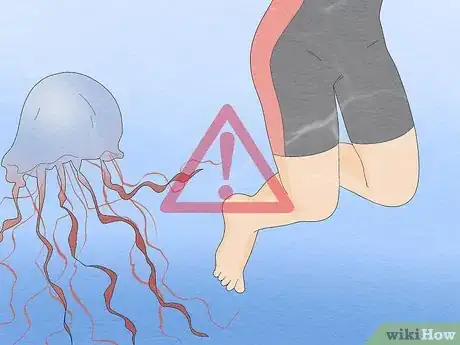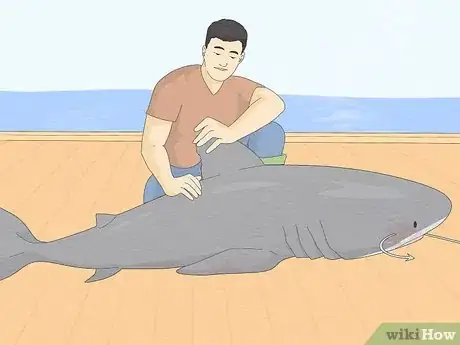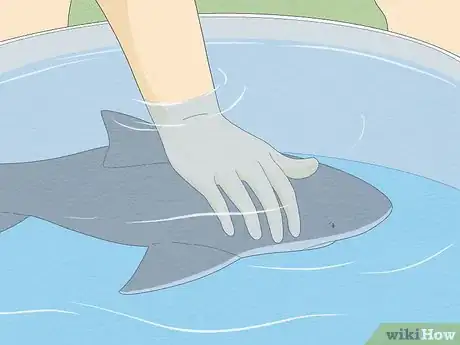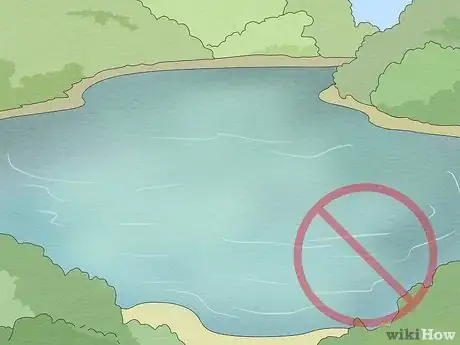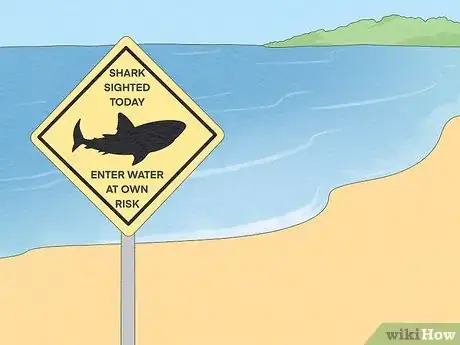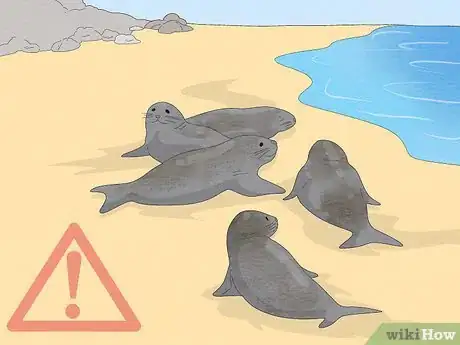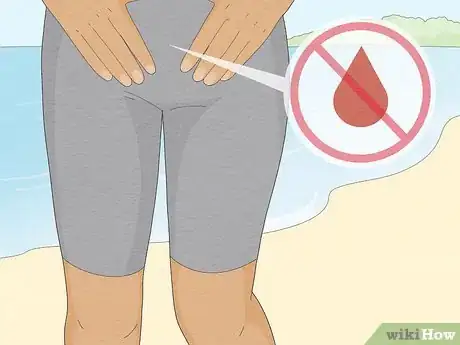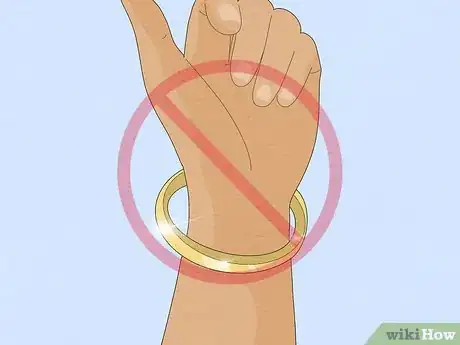This article was co-authored by Ashley Smith, PhD. Dr. Ashley Smith is a Licensed Clinical Psychologist and the Co-Founder of Peak Mind: The Center for Psychological Strength. With over a decade of experience, she specializes in treating anxiety and obsessive-compulsive spectrum disorders using Cognitive Behavioral Therapy (CBT). Dr. Smith has been featured in several media publications such as The Washington Post and Thrive Global. She has also been published in multiple peer-reviewed journals, including the Journal of Anxiety Disorders and The Behavior Therapist. Dr. Smith holds a BA in Psychology from The University of Central Arkansas and both an MA and PhD in Clinical Psychology from The University of Nebraska, Lincoln.
There are 16 references cited in this article, which can be found at the bottom of the page.
This article has been viewed 100,199 times.
The fear of sharks, called Galeophobia or Selachophobia, is a serious problem for some people. This fears keeps people from swimming in the ocean or going out on boats. While sharks are ocean predators, they pose a very limited threat to humans. By arming yourself with some shark knowledge, facing your fears, and knowing how to enjoy sharks safely, you can overcome your fear and enjoy the ocean, and maybe even start enjoying these magnificent creatures, too.
Steps
Dispelling Shark Myths by Understanding Them
-
1Learn as much as you can about sharks. To begin overcoming your fear of sharks, research sharks.[1] Becoming familiar with the habits of the sharks will help you to dispel the myth that popular culture has created of the man eating sea monster.[2] Some important key facts about sharks include:
- There are more that 465 known species of sharks.
- Sharks are apex marine predators and help regulate the ocean populations.
- Sharks exist on diets consisting of fish, crustaceans, mollusks, plankton, krill, marine mammals and other sharks.[3]
-
2Understand that sharks don't eat humans. Human is not part of a shark's diet. There is no evidence of a man-eating shark. Humans contain too many bones and not enough fat for a shark to be interested in eating. Sharks would much rather make a meal out of a seal or a sea turtle than a human.[4]Advertisement
-
3Know your odds of a shark attack. Most people who fear sharks are specifically terrified of being attacked by a shark. Setting foot in the ocean brings up images of large razor-sharp teeth. However, shark attacks are extremely rare. The odds of being attacked by a shark are 1 in 11.5 million. On average, only 5 people die from shark-related fatalities each year. To put those odds into perspective, think about these common, every day things:
- Mosquitoes, bees, and snake bites are responsible for more deaths each year than sharks.
- You are more likely to get beach-related injuries such as spinal damage, dehydration, jellyfish stings, and sunburn than you are a shark attack injury.[5]
- From 1990-2009, 15,000 people died in bicycle-related fatalities while only 14 people died from a shark attack. During that same period in Florida, over 112,000 people were injured in bicycle-related incidents while there were only 435 shark-related injuries.[6]
- You are more likely to get attacked by a domestic dog than a shark.[7]
- 40,000 people die annually in auto accidents in the United States.
-
4Know which species of sharks are most likely to bite humans. Out of over 465 known species, only a few have been known to bite humans. The great white shark, bull shark, and tiger shark have all been reported as biting humans.
- Tiger sharks are known to be social animals that divers have swum around safely. Great whites can be territorial and try to scare you out of their water, and they are curious, so they may bite to figure out what you are; however, there are accounts of large great whites being social animals that will play with divers.[8] Divers all over the world have been known to dive among bull sharks.[9] Whale sharks, one of the largest species of sharks, feeds mostly on plankton and is characterized as gentle.[10]
-
5Realize that most shark bites are out of curiosity or from mistaken identity. Most shark bites are not intended to be harmful. Instead, the bites are exploratory and used by the shark to figure out what the person is. Think about a shark bite as the same gesture that a human does when it reaches out and explores something with her fingers.[11]
- The other common reason shark bites occur is due to mistaken identity. Certain swimwear can confuse sharks. Wearing contrasting colors, like black and white or neon and black, along with patterns with high contrasting colors can confuse sharks into thinking the lighter sections of your swimwear is a fish.
-
6Think about the danger humans pose to sharks. Despite the few annual injuries caused to humans by sharks, humans cause exponentially more damage to sharks each year. Between 26 to 73 million sharks are killed and traded in markets each year by illegal poaching and by finning - slicing off the fin and then dumping the body overboard, sometimes while the animal is still alive.[12] That's, on average, over 11,000 sharks killed per hour. [13]
- 90% of the ocean's shark population has been depleted since 1970.
- Due to this, many species of sharks are on the endangered species list, and several species of sharks will become extinct in our lifetimes.
-
7Resist media shark sensationalism. Thanks to popular culture, sharks have become man-eating monsters from the depths of the ocean. Movies like Jaws have helped this stereotype; think of how many times the theme to Jaws is used to scare someone. But it's not just monster movies that have perpetuated this erroneous stereotype. Whenever there is a shark-human interaction, the news media goes crazy with it. They use the words shark attack, while many times there is no attack, just a simple shark encounter.
- 38% of so-called shark attacks reported from 1970-2009 in New South Wales, Australia resulted in no injury at all.[14]
- A group of shark scientists have started campaigning to get the media terminology changed so that news reports would use terminology ranging from shark sighting and shark encounter to fatal shark bites so that the news media might stop perpetuating negative and harmful stereotypes about sharks.[15]
Facing Your Fear
-
1Talk to a shark expert. Visit a local aquarium and speak to the shark keeper. These scientists will have a vast knowledge about sharks and can answer any questions and address any concerns you have about these animals.
-
2Confront the sharks. One of the best ways to overcome your fear of sharks is to swim with them.[16] Many aquariums offer opportunities for you to swim with sharks. This puts you in a safe, controlled environment with sharks so that you can face your fears and start to unravel the fear that all sharks are killers.
- It's okay to work up to this gradually—you might go from reading about sharks to looking at pictures and videos of them. Then, you might take a trip to an aquarium and maybe pet a smaller shark in a splash pool. Once you're very comfortable with all of that, you might consider swimming with them.[17]
- Go diving or snorkeling in the ocean. Diving or snorkeling can give you a clear view of the ocean, where you can see that there are very few - if any - sharks in most ocean water, while it's full of coral, reefs, and fish. If you do swim among some sharks, you will realize that most sharks are docile creatures uninterested in humans.[18]
-
3Go out into the water. Wade out into the water. Go swimming. Go surfing. Take a boat trip out into the ocean. Realize that being in the water isn't going to attract a shark. Don't let your fear of sharks stop you from enjoying ocean activities.[19]
- When out in the water, put your hands in the water to help you get over your fears of the unknown.
-
4Visit the sharks. If swimming with sharks or going into the ocean is too much for you, start slowly. Get close to a shark by visiting your local aquarium to check out the shark exhibit. Walk right up to the glass and look into the shark's eyes. Acclimate yourself to the sharks. Watch them, see how they act around other marine life, study how they swim and move their body. Think of them as an animal instead of a monster.
- If you are truly afraid of getting close to a shark even behind glass, look at pictures of sharks. Watch documentaries and programs that feature the true nature of sharks instead of painting them as cold-blooded killers. Become comfortable with the reality of sharks, then slowly progress towards seeing them at the aquarium.[20]
-
5Try petting baby sharks at your local fish store. At stores where they sell tropical fish, they may have small sharks. Ask the employees there if you can touch a baby shark. This gives you a chance to feel its skin and interact with it. Some aquariums also have this option. This may take away a lot of your nerves about sharks.
-
6Talk to a therapist or hypnotherapist. If none of these ideas work, try talking to a professional. A therapist might be able to help you get to the root of your phobia, which may be linked to some other, unrelated problem. A hypnotherapist might be able to help you overcome your fear by alternate means.[21]
Knowing How to Safely Co-Exist with Sharks
-
1Avoid dark, murky water. Water where you aren't easily visible can prove dangerous. A shark may not realize that you are a human and mistake you for food. This could result in a shark bite.
- Stay close to the shore. Try to stay away from steep drop offs and channel openings. Sharks are known to congregate in these places.
-
2Stay away from well-known shark beaches. While sharks are in the entire ocean, the most shark encounters seem to happen at certain beaches. A section of beach in Volusia County, Florida is well-known for its high number of shark encounters. Beaches in California, South Africa, and Australia also have a greater number of shark interaction. Research which beaches are known for sharks, and stay away from those beaches.
-
3Don't be in the ocean around dusk or dawn. These two times of day are the most active times of day for sharks. This is when they are feeding. Swimming, diving, and surfing during these times, especially in waters where sharks are known to be, can be dangerous. You are more likely to get bitten if you interrupt a shark's feeding time.
- Be cautious during full and new moons, too. These lunar cycles are when the tides are highest and may alter a shark's breeding or behavioral pattern.
-
4Resist spots with lots of seals. Be careful when swimming, diving, or surfing in spots with lots of seals. Seals are one of the main sources of food for sharks, so your chances of encountering a shark increase in these areas. You might also run the risk of a shark mistaking you for a seal and accidentally biting you.[22]
-
5Never go into the water alone. Sharks are more likely to bite a single person than a group. Swim, dive, and surf with another person. If that isn't possible, stay close within the sights of lifeguards.
- If you want to go diving to swim with sharks, always go with someone who is experienced in swimming with sharks. They can help ensure your safety. Learn about how to behave around sharks before diving with sharks, and learn as much about sharks as you can beforehand.
-
6Don't go into the water while bleeding. Blood can attract sharks, so don't go into the water if you have a fresh cut or wound. If you are menstruating, consider waiting until you are finished, or wear a leak-proof tampon.[23]
- Also refrain from swimming, diving, or surfing around areas that have dead, bleeding fish that could attract sharks.
-
7Avoid wearing shiny objects in the water. Sharks are attracted to shiny objects, along with flashes of light color on dark backgrounds. To avoid attracting a shark, don't wear jewelry, shiny bathing suits, or a mixture of bright and dark colors while in the water.
-
8Don't thrash around. If you find yourself near a shark that may be dangerous, like a great white, tiger, or bull shark, don't thrash around. Sharks are attracted to sudden, fast movements; they mistake it for a fish, and therefore, their prey.
- Try to move away from the shark as calmly and slowly as possible, though swim quickly if the shark is following you.[24]
-
9Wear special shark-repelling suits. Scientists have designed sea-camouflage suits that help divers blend in to the surrounding sea life, along with developing other suits that resemble fish that sharks avoid because they are poisonous. Another company developed a Shark Shield, a device that repels sharks by emitting electromagnetic pulses. These devices can be used on kayaks, fishing boats, and dive kits.[25]
Expert Q&A
-
QuestionDoes facing your fears work?
 Ashley Smith, PhDDr. Ashley Smith is a Licensed Clinical Psychologist and the Co-Founder of Peak Mind: The Center for Psychological Strength. With over a decade of experience, she specializes in treating anxiety and obsessive-compulsive spectrum disorders using Cognitive Behavioral Therapy (CBT). Dr. Smith has been featured in several media publications such as The Washington Post and Thrive Global. She has also been published in multiple peer-reviewed journals, including the Journal of Anxiety Disorders and The Behavior Therapist. Dr. Smith holds a BA in Psychology from The University of Central Arkansas and both an MA and PhD in Clinical Psychology from The University of Nebraska, Lincoln.
Ashley Smith, PhDDr. Ashley Smith is a Licensed Clinical Psychologist and the Co-Founder of Peak Mind: The Center for Psychological Strength. With over a decade of experience, she specializes in treating anxiety and obsessive-compulsive spectrum disorders using Cognitive Behavioral Therapy (CBT). Dr. Smith has been featured in several media publications such as The Washington Post and Thrive Global. She has also been published in multiple peer-reviewed journals, including the Journal of Anxiety Disorders and The Behavior Therapist. Dr. Smith holds a BA in Psychology from The University of Central Arkansas and both an MA and PhD in Clinical Psychology from The University of Nebraska, Lincoln.
Licensed Clinical Psychologist Definitely! Exposing yourself to your fear can definitely help, as long as you're doing it in small steps.
Definitely! Exposing yourself to your fear can definitely help, as long as you're doing it in small steps.
Warnings
- Be aware that shark encounters are one of the many hazards of participating in ocean activities. Be smart and knowledgeable about sharks, and enjoy them as a part of an active marine culture.[26]⧼thumbs_response⧽
- Be respectful of sharks. Don't try to antagonize them, approach them, or aggravate them. They will not attack you for being in the water, but you still want to respect that they can be dangerous and are natural predators. Trying to interact with them, touch them, kiss them, or ride their fins may result in injury.[27]⧼thumbs_response⧽
References
- ↑ http://www.fearof.net/fear-of-sharks-phobia-galeophobia-or-selachophobia/
- ↑ Ashley Smith, PhD. Licensed Clinical Psychologist. Expert Interview. 22 October 2021.
- ↑ http://www.defenders.org/sharks/basic-facts
- ↑ http://www.streetdirectory.com/travel_guide/38179/recreation_and_sports/dont_be_afraid_of_sharks_when_surfing.html
- ↑ http://www.flmnh.ufl.edu/fish/sharks/Attacks/perspect.htm
- ↑ http://www.flmnh.ufl.edu/fish/sharks/attacks/relariskbike.htm
- ↑ http://www.flmnh.ufl.edu/fish/sharks/attacks/relariskdog.htm
- ↑ http://www.telegraph.co.uk/men/the-filter/11159623/How-to-conquer-a-fear-of-sharks-swim-with-them.html
- ↑ http://www.fearfuladventurer.com/archives/6814
- ↑ http://www.streetdirectory.com/travel_guide/38179/recreation_and_sports/dont_be_afraid_of_sharks_when_surfing.html
- ↑ http://www.animalplanet.com/tv-shows/my-extreme-animal-phobia/phobias/fear-of-sharks-galeophobia/
- ↑ http://ocean.si.edu/ocean-news/5-reasons-revere-not-fear-shark
- ↑ http://matadornetwork.com/change/35-surprising-facts-about-sharks-that-might-change-your-opinion-of-them/
- ↑ http://www.southernfriedscience.com/?p=15258
- ↑ http://www.southernfriedscience.com/?p=15258
- ↑ http://www.fearof.net/fear-of-sharks-phobia-galeophobia-or-selachophobia/
- ↑ Ashley Smith, PhD. Licensed Clinical Psychologist. Expert Interview. 22 October 2021.
- ↑ http://www.fearfuladventurer.com/archives/6814
- ↑ http://matadornetwork.com/bnt/4-steps-overcome-fear-sharks/
- ↑ http://www.fearof.net/fear-of-sharks-phobia-galeophobia-or-selachophobia/
- ↑ http://www.fearof.net/fear-of-sharks-phobia-galeophobia-or-selachophobia/
- ↑ http://www.surfinghandbook.com/knowledge/sharks/
- ↑ http://www.surfinghandbook.com/knowledge/sharks/
- ↑ http://www.surfinghandbook.com/knowledge/sharks/
- ↑ http://www.theinertia.com/environment/4-ways-that-science-can-help-you-overcome-your-fear-of-sharks/
- ↑ http://www.flmnh.ufl.edu/fish/sharks/Attacks/perspect.htm
- ↑ http://www.animalplanet.com/tv-shows/my-extreme-animal-phobia/phobias/fear-of-sharks-galeophobia/
About This Article
To get over your fear of sharks, try gradually exposing yourself to them until they're not as scary anymore. For example, you could start by visiting an aquarium to look at sharks safely through the glass. Then, you could move on to petting a baby shark at an aquarium or fish store. After that, you could try cage-diving with sharks to watch them up close in a safe, controlled environment. Over time, as you slowly expose yourself to sharks and see for yourself that they're mostly harmless, you'll find that you're less and less afraid of them! For advice on how to safely co-exist with sharks, scroll down!



